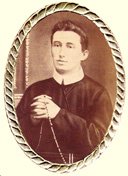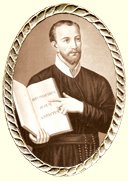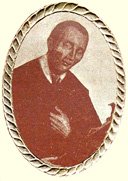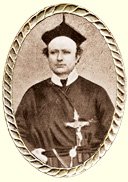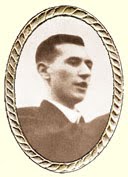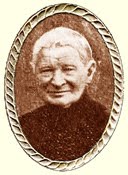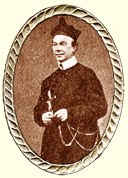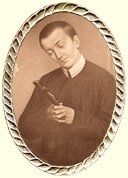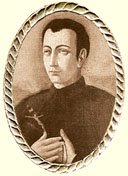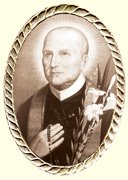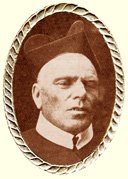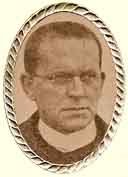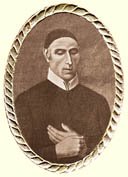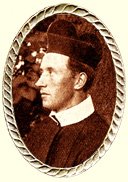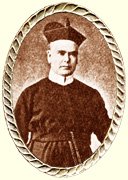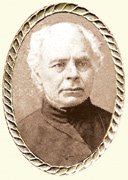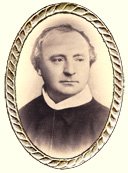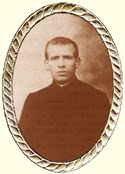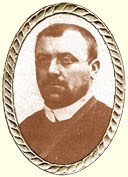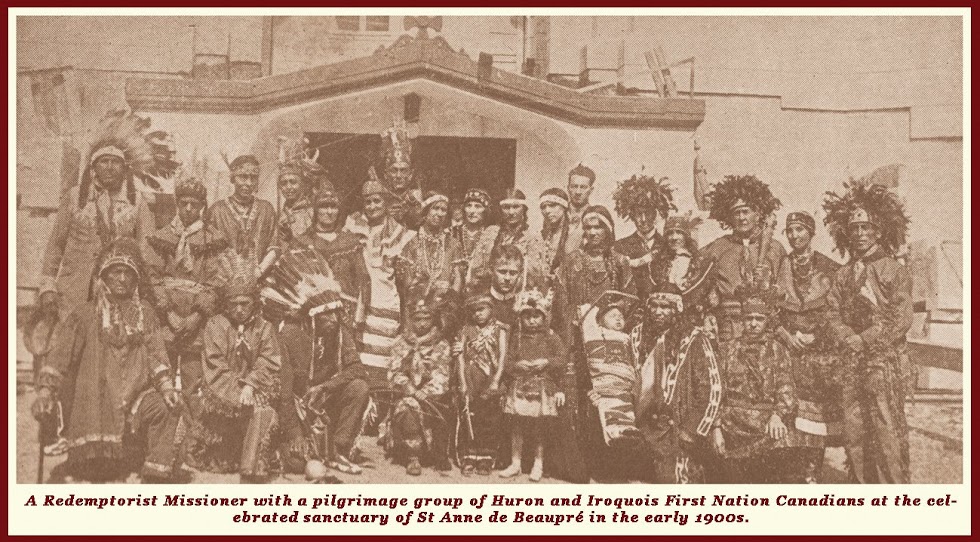The Servant of God Rev. Br Dominic Blasucci, C.SS.R. (1732-1752)
Redemptorist Student
by Rev. Fr Antonio Tannoia, C.SS.R.
The birth of this child of grace, which took place on the 5th of March, 1732, was attended by many surprising prodigies. In the first place he occasioned his mother no inconvenience whatsoever while she carried him in her womb, so that she could scarcely believe that she was really pregnant. He came into the world covered with a thick membrane, and surrounded with an equally extraordinary girdle, which caused his mother to exclaim, “Miserable creature that I am! I have given birth to a shapeless mass!” When the midwife however disengaged him from this covering, it was found that his limbs were not only quite perfect, but that he was a most beautiful infant. Scarcely had he entered the world, ere, to the great astonishment of all who were present, he raised his tender arms, and devoutly folded them together on his breast in the form of a cross as if God thereby wished plainly to foretell the heroic resignation with which he would one day abandon himself to the divine will, and the loving tenderness with which he would unite himself to God to suffer with Him on the sacred wood of the cross. At this sight the midwife consoled his mother and said, “You have cause for joy, for you have not only brought forth a beautiful child, but a saint; the covering in which he was born, the girdle which surrounded him, and the way in which he crossed his arms, are so many manifestations of great holiness.”
Dominic began to taste the precious fruits of the tree of the cross very soon after his birth for his mother had no milk, which caused him to fall into a dangerous illness when he was but two months old. He was one day supposed to be dead, and wept for by his parents as such so that his eldest brother even went to the parish church and told the sacristan to toll the bell to announce his death; when he returned home to wait for the priest who was to accompany the corpse to the church, he was therefore not a little surprised to find that his brother was miraculously restored to life. The mother was inconsolable at the idea of losing her son, and being animated by a lively faith, she had recourse to God, and poured some drops of holy water into the baby’s mouth, after which he was immediately restored to life. When he recovered, he was suckled by Donna Felice Pepe, the wife of D. Peter d’ Agostino, who was then the tax-gatherer of the province of the Basilicate. She had been shortly before confined of a little girl, and undertook to nurse little Dominic with great charity and maternal tenderness.
It may be said that the bright lily of virginal purity, which he preserved unspotted to the tomb, began to spring up in heart from his very infancy. He loved Jesus in the Blessed Sacrament, and the Blessed Virgin with the utmost ardour from his earliest years. He often received Holy Communion, and never approached the altar without having first made an hour’s preparation, which was accompanied by a flood of tears. His thanksgiving lasted until dinnertime, so that when the sacristan went to lock up the church, he found him still kneeling motionless before the Blessed Sacrament. The visit he used to make to this Divine Saviour during the day often lasted for three entire hours. Words cannot describe all the tenderness of his love towards the Blessed Virgin Mary or relate all the fasts, novenas, and devotions he practiced in her honour. It will suffice here to mention that these words were found in his little prayer-book: “That he wished to burn and be consumed through love to Mary; that he wished to love her as much as she was loved by the Blessed Trinity”; and he fasted on bread and water every Saturday in honour.
He caused the sweet lily of his purity to flourish daily more and more, and added intensity to the fire of his devotion by the severity of his penances. Amongst others, he went so far as even to abstain from grapes although he staid in his vineyard during the time of vintage, which must have been most trying to one of his age.
God had endowed him with rare beauty and great talents. He was scarcely twelve years of age when he had finished his grammatical studies; and it was not long afterwards when he had perfected himself in rhetoric, philosophy, and canon law under the direction of his uncle, the archpriest D. Donatus Anthony Carnevale, in which studies he was accompanied by his two brothers Peter and Francis Blasucci, and his cousins Francis Carnevale and Pascal de Paola.
But who can paint the splendour of the virtues which shone forth in him after he entered our congregation? He was never seen to transgress the least rule, and from the beginning of his noviciate he had formed this resolution: “I would rather give up striving to become a saint, than transgress the most minute portion of my rules.” The obedience which he rendered to his superiors was sometimes really miraculous.
One day the father-minister said to him, “Brother Blasucci,… go…” and without waiting to hear the rest of the command, he hurried away. When he got half way, he was called back again to give an account of what he was going to do, “I am going to tell Father N. to go to the confessional,” he replied; after which he once more set out to fulfill his orders. The father-minister was quite amazed at his answer for he well knew that God alone could have revealed his intention to him; and turning towards the fathers who were near him he said, “Would that I were far advanced in perfection as brother Blasucci. See to what extent his obedience is carried.”
We will now quote some of his maxims with reference to this virtue:
“If a religious does not practice entire obedience, he is worse than lost. The slightest private interpretation is enough to destroy all the merit of obedience. I would not exchange one act of obedience for a hundred hours of mental prayer full of spiritual consolation. If I had virtue enough to perform one action of true obedience, I should think that I had made a great step onwards in the paths of perfection. He who only obeys imperfectly will never become holy because he will always be yielding to the impulse of self-love,” etc.
It would be impossible to describe the fasts, mortifications, rough hair-cloths, and the bloody disciplines with which he macerated his innocent body. Suffice it to say that our Father Alphonso once made this remark, “I only know of one fault in Blasucci, he mortifies himself too much.”
Neither would it be impossible to give an adequate idea of his virginal purity, his love for Jesus in the Blessed Sacrament, and for the Blessed Virgin or of his other truly heroic virtues. In a word, Dominic was an angel of innocence, a martyr of penance, and a seraph of love. This love was most ardent towards the Blessed Virgin, and most universal in regard to his neighbor.
But the time soon arrived when God rewarded the virtues of His faithful servant. We may say with the Holy Spirit, that his death was truly precious in the sight of the Lord. During his last sickness, he received Holy Communion daily in the church, except on All Souls’ Day, 1752, when the Blessed Sacrament was conveyed to him in bed, and soon afterwards he breathed forth his pure soul into the bosom of his God ere his thanksgiving had ended while surrounded by all the fathers and brothers of the community, who shed tears of joy. His body remained unburied for twenty-eight hours, and it was as flexible throughout the time as if he had been alive. When it was placed on the bier in the church, he suddenly opened his eyes and fixed them on Father D. Paul Cafaro, the rector of the house at Caposele. At this sight D. Nicholas Santorelli was quite stupefied with astonishment. “Do not be afraid,” said Father D. Cafaro to him, “I mentally commanded him to open his eyes to enable his portrait to be drawn.” He was taken out of his tomb twenty days after his death, when a vein was opened, and blood poured forth as if he had been alive.
A more detailed life of this servant of God, whom with God’s blessing we trust may one day succeed in causing to be honoured on our altars, will be published hereafter; however, for the satisfaction of our readers, we will add some details of great weight and interest. Let us begin by giving the testimony of the brother infirmarian who attended him during his illness.
"If I were to enumerate all the heroic virtues I saw our good Father Dominic practice,” said he, “several volumes would not contain all I should have to say; I will therefore only mention some facts which came specially under my notice. It is already known that all the fathers and brothers of our congregation unite in one voice in praising and blessing God for the great favours which He bestowed on him… Suffice it to say that every one called him a second Aloysius of Gonzaga, etc….
He specially delighted in exercising charity. When he saw a brother was in suffering or disquiet, he instantly made it a point to calm and comfort him; and he did this so effectively, that it seemed as if he knew even the interior motions of their hearts. One day Brother Caesar, as he himself has told us, was tormented by interior trials. Our good Father Blasucci met him while in this state, and as he probably saw by his countenance was much agitated, he said a few words of consolation to him, and immediately, and as if by miracle, Brother Caesar’s countenance became serene and tranquil. (We heard this from his own lips.) It seemed as if God wished to the world the eminent sanctity of this dear and well-beloved son and disciple even during his life-time, by the abundant graces with which He favoured him, and which were often miraculous.
"We may judge of this by the following instance, which our Brother Gerard is ready to affirm on oath; and this brother’s evidence is worthy of peculiar deference, as every one believes him to be a saint; for my part, I am sure he is so. Brother Gerard then was one day suffering more than usual, especially interiorly, and his heart was so dried up within him that he felt almost driven to a state of despair (these are his own words). Father Blasucci perceived that something was amiss, and asked him what was the matter. He told him, and at the same time begged him to deliver him from his pain. In reply Blasucci made the sign of the cross on his heart, and immediately Gerard became perfectly free from all his former suffering. He always attributed this sudden change to Brother Blasucci, and kept it secret until now. I could also mention a prodigy which happened to myself at the time of his death, but I cannot do so until I have spoken to my director. I feel sure that if I could make this known, it would also contribute to the glory of our deceased brother.” And here ends the narrative of the infirmarian.
The archpriest D. Donatus Anthony Carnevale, who was Dominic’s uncle, terminates his account in the following terms: “Wherever his death became known, everyone exclaimed with one voice, ‘He is blessed! He is a saint!’ There were even some gentlemen who wished to obtain possession of his body; and when I announced the death of Father Blasucci to Mgr. de Muro, and the pains which were being taken to collect materials for the composition of his life, D. Vito Muro replied that he wished these attestations to be made juridically to give them more weight, on account of the numerous prodigies which had already been operated by his intercession.”
Two of them were attested by the same archpriest in a letter to his nephew D. Peter Paul Blasucci, who is now rector-major of our congregation. He says, “Mary Caparso, who was dangerously ill and given over by the doctors, was instantly cured by touching his habit. Donatus Anthony Pitocco, who was afflicted with a malignant fever, applied a morsel of his habit towards evening, and was cured next morning.”
With regard to his union with God, a member of our congregation wrote as follows: “In consideration of his bodily infirmities, his director forbade him to think of God. But this command caused Father Dominic the most intense agony; if he thought of God, he was afraid of being guilty of disobedience, and if he did not think of Him he felt as if he must die. In fact he was so full of divine love that his thoughts and even his senses caused him to become absorbed in God, as it were, in spite of himself.
Sad indeed was it then to the heart of our Dominic when thus torn from his God whom he loved so ardently, by the mandate of his director, whose voice was to him as the voice of God Himself. Not being able to bear such intense suffering any longer, he wrote to his father confessor, saying, ‘You wish to sever me from God in order to preserve my bodily life; but it is evident that the violence I have to use in detaching myself from Him will soon kill me; union with God has become natural to me, and in spite of all my efforts, I am with Him, as it were, imperceptibility. I do my best to resist the plenitude of celestial grace. I do violence to myself that I may obey, but how can I fight against God, who kindles this bright flame in my heart, which I have neither the courage nor strength to extinguish?’ In such a case death alone could give consolation to our Father Dominic.
"It was a touching spectacle to see him leave the choir; after giving a deep sigh, he would make a profound inclination and get up; then he would make another genuflection; after taking a step or two, he returned to cast a last longing look at Jesus in the adorable Sacrament, when he sighed and genuflected anew, and this he repeated at least three times; if he succeeded in tearing himself away at last, he did so with such regret that it seemed as if his soul would be severed from his body.
"A companion one day said to him, ‘What thanksgiving do you make to Jesus Christ after communion?’ ‘Ah!’ he replied, ‘one does not know what one does then; one feels as if heaven were in one’s heart. Were it possible, I should like my heart to dissolve in divine love as wax melts before a burning flame.’
"Once when he was walking in the garden with a friend, he said, raising his eyes to heaven, ‘Ah! Lord! When will that happy day arrive, when I shall be wholly united to Thee!’ He always knelt during meditation and the other pious exercises, and never sat down but by the express desire of his superiors. His recollection and devotion in prayer were so great that they even inspired the same sentiments in those who beheld him. One day when the zelator visited him, he found him in such a devotional posture that he could not help saying to another brother, ‘Brother, I visited Brother Blasucci’s room to-day while he was meditating; methought I saw a St. Philip Neri, and I retired in great emotion.’ However great might be his infirmities, he used to take discipline so severely that the mere sound of the blows was quite appalling.”
The following account is also worthy of notice. It is from the pen of Father Picone, who was Dominic’s co-novice, and who has since become an excellent father. “The first time I saw him, I felt as if I were looking at an angel,” said he, “for his face even then had an air of indescribable sanctity. Even when his health was very bad, whenever he was asked how he was, he replied, ‘I am well’: except on the morning of the day he died, when he said, ‘I do not feel well.’ He used at first to mix bitter herbs with all he ate, but this was afterwards prohibited. The severity of the way in which he disciplined himself was ascertained by the noise of the blows he gave himself, notwithstanding his great weakness, and by the large drops of blood which were found on the walls of his room. He walked with much difficulty, like a kind of machine, and yet never said, ‘I can do no more.’ He never leaned against anything during meditation; but remained motionless throughout the time with his eyes cast down and with the utmost modesty and devotion. He practiced mortification and recollection to such a heroic degree that he thereby shortened his days. He put us all to confusion by his fervour in the noviciate, and when I went to visit his room, his very appearance was enough to make me recollected.”
Father D. Alexander de Meo thus expressed himself in a letter he wrote to me from Nocera on the 9th of November, 1752: “It is said that our dearest, and, alas! for us now too happy Brother Blasucci has taken flight to heaven, there to plead, as we humbly hope, the cause of the congregation, to our beloved mother. Everyone calls him blessed; for my part, I have no doubt whatever that he is so. The ardour he felt to advance daily in the love of God has now obtained a glorious consummation; the sufferings he loved to endure that he might thus become more pleasing to Him are terminated. ‘Jam dicit spiritus, ut requiescat a laboribus suis, jam enim hyems transit et opera sua ipsum sequuntur’, to produce for him in the kingdom of the saints, ‘æternum gloriae pondus.’ I earnestly entreat you Reverence to collect together as many particulars regarding this holy brother as possible. I could make the most fervent eulogiums on him, and even attest them on oath, but only in general terms because I never knew him intimately. Yet I would gladly sacrifice my life, and shed all my blood, and do all in my power to make known the goodness of God towards the soul of this His most faithful and most innocent servant. You can consult Father D. Andrew, and I will speak to Father D. John. Apply also to his brother, whom I congratulate on having a brother so dear to God in heaven, for I am certain he now enjoys the beatific vision, that is to say, if he be really dead, which however is a fact that we are not sure of; we received the tidings from the Father D. Peter Genovèse, who says he heard that he died on All Souls’ Day. But this was nine days ago, and how is it possible that we should not yet have received direct information on the subject? Whatever may be the case, I place myself at your disposal in this matter, as I am sure that in any event it is one of much moment.”
In the funeral sermon which the same Father D. Meo afterwards preached at Nocera on our Dominic, he mentioned many facts worthy of admiration. We will content ourselves with quoting the following passages: “He appeared so calm that he looked as if he were an angel under the semblance of humanity, so absorbed did he seem in loving contemplation of his God… But I feel most admiration when I remember how he never ceased to act when he was in the room with a companion; he placed himself near the door, and there, with one hand on his breast and holding a book in the other, he staid motionless as a statue without resting hand or foot against the table; he did not lean back in his chair nor open or shut either the door or window, however hot or cold the weather might be; he never spoke to his companion or moved so much as a book or chair or even shook the hour-glass on the table, which anyone else would have done unthinkably; but we need not wonder at this, since he had such entire self-control that he never indulged in any thought, movement or word which was not solely for the glory of God.”
By this superhuman conduct he gently won over all hearts; even strangers often asked who he was, and everyone looked upon him as a saint. He made such an impression on a gentleman and doctor of Nocera (whose name I do not feel at liberty to mention,) during the spiritual exercises at Ciorani that he not only wrote down his name, but he also asked for his discipline, which he kept as a relic. We were more than once obliged to make him change his cap and other things of the sort in order to satisfy the piety of the faithful. Strangers however were not the only ones who thus honored him; for those who saw him most frequently had the greatest veneration for him, which is by no means a usual occurrence. There were some of the novices who secretly kissed his clothes as often as they could, and our father rector-major himself acknowledged that he felt a most peculiar degree of respect and veneration for him.
He was as humble as it was possible to be. Although he was very learned, he tried to appear ignorant, and never was heard to utter one word which could display his knowledge. On being asked if he had run away from his paternal house to enter the congregation as all the other novices had done, he replied, “Why should they wish to detain me at home? Nothing could be expected from me.” If anyone went up to speak to him, he arose, and with his cap in hand, listened to what they said with all humility. He blushed at either being named or being looked at. If his superiors praised him, he said, “O wretch that I am! I am so imperfect that my superiors have to win me over by caresses.” He asked his spiritual father for penances with many tears. “I must do penance,” said he, “for fear God may abandon me.” When he spoke of himself it was plain that he believed himself to be the greatest sinner in the world.
On one occasion when a letter of inquiry regarding his health was addressed to him, he replied in tears in confusion at any concern being felt for the health of such a useless creature, who according to him was not as valuable as a little fly. He attained a degree of perfection at which few saints have arrived, for he rejoiced even in his inferior nature at being despised, reviled, and ill-treated. Yet all his directors have assured me that he always preserved the robe of baptismal innocence without spot, and that they never discovered any deliberate venial sin in him or even any willful fault. He observed even the most trifling rules, and they were not few in number amongst us. In fact, our Dominic may be called the model, the ideal, and even the soul of our institute.
Devotion towards his beloved Mother Mary, whom he loved more than aught besides, was his most distinctive characteristic as is plainly evinced by all the novenas he made, by all his familiar conversations in her honour, and by his sedulous care never to commence anything without first asking her permission and saluting her.
Though the hand of death was then laid on thee, dear brother, this formidable enemy had no terrors for thee; for thee caresses and tender embraces alone are in store; for thee sadness, tears, and anguish are over in thy regard; and now “neque luctus neque clamor neque dolor erit ultra.”
Were there however no other testimony to the sanctity of Dominic than two letters we are now going to quote, they alone would suffice to cause him to be canonized. One of them was written by Father D. Bernard Maria Apice, who was a celebrated missionary; and the other by Father D Paul Cafaro, so distinguished for his extraordinary holiness. Let us now quote that of Father Apice:
“R. B. D. Anthony Maria Tannoja, of the Congregation of the Most Holy Redeemer, from Ciorani. My very dear Father Tannoja, – I write to inform you of the manner in which our dearest Brother Dominic Blasucci passed from this life into Paradise on All Souls’ Day. I say into Paradise, for I feel assured that he did not even go near purgatory (and our Father Carfaro maintains this also,) and I always have said to those with this angelic young man, that if he has had to endure the pains of purgatory, persons like ourselves would have nothing to hope for. I had the consolation of being with him when he died, and assisted him to hold the blessed candle in his hands during the last half hour of his life; and he expired in my arms.
"It would be needless to tell you of the holiness of his life, for I am sure you are well aware of it. But I think it will at least give you consolation if I mention a few things regarding him. I had the happiness of seeing him frequently at Ciorani and at Iliceto, and also in the house at Caposele, where his saintly life terminated. I was commissioned to convey him in a carriage to Iliceto. He left Ciorani on the 3rd of September, and reached Iliceto on the 5th. I learnt many a lesson during this journey. Although he was quite exhausted and panting for breath, he never took any recreation, but either remained in silence at the back of the carriage, or conversed on spiritual things; and when the hour of meditation in common arrived, he would say, to my shame and confusion, ‘My father, let us make our meditation.’ When we reached Ponte di Bovino we could not find any steeds so were obliged to walk to the town of Bovino, and our brother went up that steep hill, which is more than a mile in length with the utmost patience and without making a single complaint although he seemed ready to expire at every step. He gave the most heroic examples of virtue whilst we were at St. Mary’s of Consolation.
"His purity was heroic. He has often owned to me that he had never felt a temptation of the flesh in his life. His obedience was heroic likewise. He not only obeyed his superiors, but also his inferiors, even to the cook, when he assisted him in his work; and he exercised these virtues from morning until night. His humility and self-abnegation were also heroic. As to the renunciation of his own will, he had practiced it throughout his life. No less heroic was his conformity to the will of God and his recollection; indeed this latter virtue might be called his favourite virtue. Whether he was walking, eating, or speaking, his union with God was plainly depicted on his countenance; indeed, I think that even when asleep he might have said with the spouse in the Canticles, ‘Ego dormino, et cor meum vivilat.’ When obedience compelled him to go out, he walked with his arms folded with an air of angelic modesty, which indeed never left him, from morning until night, and he used softly to sing some pious hymn to excite himself to still greater love for and union with God.
"He captivated the hearts of all who saw him by his modesty and recollection; if one merely looked at him, it was enough to cause recollection. He visited the Blessed Sacrament several times a day, and every evening whilst we were saying office in the choir he used to perform the Way of the Cross.
"His sanctity made the deepest impression on the bishop of Cedogna, and whenever he came to make his retreat with us, he made it a point to have Brother Dominic to serve his mass. When he left Pagani he was a model of virtue to all the students as St. Aloysius de Gonzaga and John Berchamns had been before him. He came to Caposele for change of air about six months before his death. When I think of this period I feel lost in astonishment and confusion, and I know not where to commence the recital of his heroic virtues. From this time he did nothing but prepare to welcome his Divine Spouse as if by some secret presentiment of his approaching death.
"He was always engaged in meditation either in the choir or in the church; he did not stay a long time, because his superior had forbidden him to do so, but he repeated it very often in the day, so that he seemed always going to or from the choir and church; hovering round the Blessed Sacrament like a loving butterfly fluttering around the sweet-scented flower. The fathers accused him of this to the superior who gave him a sharp reprimand, and ordered him not to think of God more than ten times a day for the future; but on one occasion when this youthful saint was with his companions, he inadvertently said that he could not distract himself from the thought of God upon which his superior saw that the attempt was only injuring his health, and at once withdrew the command. He was exceedingly anxious to go through the religious exercises like the others, but the superiors dispensed him from them, but from the time he got up he was always trying to do as much as obedience permitted. Only two or three days before his death, he still came to the choir after vespers to join the community in making a visit to the Blessed Sacrament.
"I will not dwell on the heroic virtues he practiced during his long-continued illness, of his submission to his superiors and inferiors, and especially towards the brother infirmarian, whom he obeyed most punctually; of his patience, which prevented his ever uttering the slightest complaint, and of his constant and unabated fervour, which it is so difficult to preserve during illness. In a word, he daily exercised the most eminent virtues although they were not displayed before the eyes of men. He was known to God alone for he was wholly interior and recollected in God.
"When he expired, I could not refrain from shedding tears of consolation at having seen a saint die; but this joy was soon turned to bitterness when I examined my own life, and saw all its imperfections. I wept much, especially while I was reciting the prayers in the ritual of our holy Church, ‘Occurrite angeli Dei,’ etc., O my Father! ‘ecce quomodo moritur, justus.’ I must now conclude; time fails me; it is night, and I am oppressed with sleep, and I have no more paper or ink, etc. I hope you will read this in public for the consolation of all, and I commend myself to your prayers.
"I am your Reverence’s most humble and affectionate servant and brother, in union with the Sacred Heart of Mary of Sorrows,
Bernard Maria
Caposele of the Most Holy Redeemer.”
The letter written by our Father D. Paul Cafaro, who was at that time the rector of the house at Caposele, is no less interesting. It was addressed to our most Reverend Father D. Alphonso de Liguori, rector-major of the Congregation of the Most Holy Redeemer, and was as follows:
"Nocera of the Pagans.
"Hail, Jesus and Mary!
"In general terms I may say that our Brother Blasucci, of happy memory, was a saint who is worthy to be canonized, and I asserted this more than once while he was still alive. His virtues strike me as being truly heroic, for he was really dead to all passion, so that every virtue seemed naturalized in him. There was such perfect and universal rectitude in all he did that the greatest saint could not well have surpassed him. But all his excellence proceeded from his thrice heroic conformity to the will of God from which proceeded his entire indifference to all things, to suffering or joy, to life or death. How many times was I not filled with holy joy during his illness when speaking to him of death!
"Life and death were the same thing to him; but he often told me, when I asked if he would rather live or die, that if he only consulted his own inclinations, he would give the preference to death. Notwithstanding the painful nature of his disease, for he could not take nourishment or swallow the wine which the doctor ordered for him without the most painful efforts, I never saw him give way to the slightest degree of impatience. Recollection and a constant sense of the presence of God were habitual with him up to the last moment of his existence. Everyone can render testimony to the brightness of his other virtues, especially those who saw most of him; I have always said and I still repeat that Brother Blasucci carried conformity to the will of God to the most heroic degree. Yes, conformity to the will of God, and the most entire perfection in all his actions, both interior and exterior, were his special characteristics.
"He communicated daily in the church, except on All Souls’ Day when I made him receive Holy Communion in bed. After this, and while he was making his thanksgiving, (or very shortly afterwards) he lost his speech, received Extreme Unction, and died amidst all the fathers and brothers, who were filled with consolation by his precious and saintly death. After he had been buried for twenty-eight hours, his head and arms remained so flexible that it seemed as if he were still alive. I have not time to enter into any further details for I am on a mission. What I have said however would be enough to canonize Blasucci. I look upon him as a saint, and have kept a piece of his habit as a relic.
"I beg your Reverence to bless me and kiss your hands. I remain
Your most humble servant and son,
Paul Cafaro
Of the Most Holy Redeemer
Vallata, 15th of November, 1752.”
Short Life of
Rev. Br Dominic Blasucci, C.SS.R.
by Rev. Fr Joseph Landi, C.SS.R.
God has been pleased to raise up models of virtue and perfection in our congregation not only among the fathers and missionaries, but also among our simple brothers and youthful students.
Amongst these latter may be numbered young Blasucci, who was born of respectable parents at Ruvo in the diocese of Muro in Basilicate, which is a province which belongs to the kingdom of Naples. He was christened Dominic, although it would have been more appropriate to call him Angel since his first appearance in the world, his life and his death resembled those of an angel.
He led a pure and innocent life from his very childhood; he often went to confession and communion, did not mix with children of his own age, and spent all his time in his studies and devotional exercises. From the time he began to know God, he also began to love and serve Him, and the regularity of his conduct caused everyone to look upon him as a most devout and well-conducted young man.
But God wished him to be still more closely united to Him, and that he should imitate the angelic St. Aloysius Gonzaga in his life, conversation and death. As soon therefore as Blasucci perceived the vanity and illusions of the world, his only desire was to find a place of refuge wherein he might be sheltered from the storms which so often cause those who live in the world to make shipwreck of their faith. As he heard that a new congregation of missionaries had arisen in Holy Church who made special profession of perfection and holiness, and who spent their lives in working out first their own salvation and then that of their neighbor, and when he also saw that even the most hardened and desperate sinners were converted by the frequent missions they gave in the kingdom of Naples, he wished to devote himself to God in the new institute, both for the sake of his own perfection, and also to satisfy the love with which he was inflamed for God, and his zeal for the salvation of the souls of the poor, which were redeemed by the blood of Jesus Christ.
As this desire became daily more and more ardent, he earnestly begged our superiors to receive him into the new institute of the Most Holy Redeemer, and he was the more anxious to enter into this community as it had been approved by the Sovereign Pontiff Benedict XIV. Upon his reiterated entreaties, the superiors gave him some hopes of being admitted as they saw the marks of a true vocation to our congregation in him, and that he was endowed with many excellent qualifications for the life of a missionary; but as they were afraid that his feeble constitution would be unable to bear the great fatigues and hard study which we have to undergo, they would not at once consent to receive him. Dominic however spoke so plausibly, his manners were so engaging, and he reasoned so eloquently on how God would give him all needful strength, that he at length succeeded in moving the superior, and in the year 1750 on the 2nd of February (the feast of the Purification) he was admitted as a novice to the college at Ciorani where there was then a most flourishing noviciate.
Young Blasucci was seventeen years of age ten months and seventeen days at this time. When he was clothed in the habit of the Redemptorists and found himself among the many angels we had then in the noviciate, his humility caused him to believe that he was so inferior to all, both in respect to science and to virtue that he even felt a kind of shame in being amongst them. At every instant he feared that his novice-master would send him away on account of his faults; in order to prevent such a misfortune, he was most careful in observing the most minute regulation in the novices’ directory, he devoted himself to the practice of the most prompt and implicit obedience, and to entire mortification of the senses and to a life of the most rigorous penance. When his companions saw the way in which their Brother Blasucci advanced in the career of virtue with giant’s speed, they were filled with admiration, and not only despaired of ever making the same progress, but of even following after him at a distance.
His calm and modest demeanour betokened the love of God which inflamed his soul. His charity, like a fire which burns more and more brightly in proportion to the amount of fuel within its reach until at length enkindles all around it, unceasingly found fresh fuel in the good dispositions of his soul, and so its sway became more powerful and extensive from day to day. Our Brother Blasucci thus followed in the footsteps of the angelic St. Aloysius, and lived, as it were, in a continual ecstasy, for he was always recollected and united to his God. He ate so little, especially at supper, that what he took was scarcely amounted to a few ounces in the day, and he mingled bitter herbs with what he took, which he pounded and carried about with him that he might never be without them. He was as careful in mortifying all his other senses; he scourged himself to blood, and fasted on all Saturdays in honour of the Blessed Virgin, although his habitual temperance was in reality a perpetual fast.
In a word, he was an object of admiration to all who saw him, and he shone forth amongst the other novices like the sun among stars for he eclipsed even their brightness by the dazzling splendour of his transcendent virtues. When strangers came to the house at Ciorani, I especially refer to those who came to go through the spiritual exercises, they were quite delighted whenever he read in the refectory or in the church, and his readings produced more fruits than the sermons of the preacher; indeed some of them would even cast themselves at his feet and kiss them with veneration. His devotion towards the Blessed Sacrament caused him to communicate almost daily, and he made spiritual communions more than a hundred times in the day. As he was so constantly occupied about spiritual things, and as his mind was always recollected as if in the presence of God, it was observed that he soon became very thin and emaciated. This was not paid much attention to at first, however, as it seemed to be only a natural result of his excessive fervour.
At the expiration of the year’s noviciate, he pronounced his vows according to the rule of our institute on the 2nd of February, 1751 before Father D. Xavier Rossi by the command of our most reverend father rector-major. He had ardently longed for this happy moment to arrive, and every instant which separated him from it seemed an age, so ardently did he desire to become more closely united to his God. He began to study with the others as soon as he left the noviciate, but his first fervour did not therefore suffer any relaxation. He continued to practice all the devotional exercises he had been accustomed to as a novice; he was always recollected in the presence of God, and he did not diminish any of his macerations and penances so that in a little time he was attacked by consumption, which brought him to the portals of the tomb.
When his superiors discovered what was the matter with him by his difficulty in walking and wasted appearance, they immediately forbade him to apply closely to anything; and in order to prevent the continual tension of his mind, caused by the way in which it was always fixed on God, they enjoined him never to make a voluntary act of the presence of God, nay, they even gave him amusing books to read, and required him to give an account of their contents. But all was of no avail for God drew him more closely to Himself day by day. He was sent into another house for a change of air, but this was equally unsuccessful; he was then made to accompany the fathers when they went on missions, but the only effect which this produced was that he converted more sinners by his modest and recollected appearance than the preachers could succeed in doing by their sermons.
I remember that on one of these missions at Langhusi, our Father D. Blaise Amarante made him kneel in the middle of the church whilst he was in the confessional, and if he met with any hardened and obdurate sinners who would not repent, he said to them, “Go and look at that saintly young man, see how modestly he kneels there, and then return here again.” And when these sinners saw this angel in human shape, kneeling motionless and still before the Blessed Sacrament, and perhaps also through the efficacy of his prayers, they returned to his feet full of repentance and compunction.
His superiors thus did all they could to restore him to health for upwards of two years, sometimes sending him to one house, sometimes to another, sometimes causing him to apply to study, and at other times procuring him innocent diversions; but all was in vain; he grew worse instead of better, and no doubts could any longer be entertained that he was in a consumption. For the edification of the house at Caposele, Providence ordained that he should be in it when he became too ill to go about anymore, and was obliged to keep his bed, and be under obedience to the doctor and infirmarian. He was most exact in obeying their most minute directions in all things during his last sickness, and as he knew that he would soon be admitted into the presence of God whom he adored, he appeared more recollected than ever, and as if he were in an ecstasy of love. His thoughts were of God alone, and he never spoke of anything but God and heaven.
At length the hour of his rest drew nigh. After he had received all the sacraments, he gently expired with his crucifix in his hand and reposing in full confidence in the arms of his dear Mother Mary on the 2nd of November, 1752 in the twenty-first year of his age. Shortly before this he had succeeded in getting his brother D. Peter Paul Blasucci to enter the congregation by his prayers to God, and by his persuasive words and letters, which made him say in his last moments, “I die in peace now that my brother has entered the congregations.” He had indeed much reason to rejoice at it for he afterwards became the founder of the house of Girgenti in Sicily, and has always been distinguished amongst us for his learning and piety.
Scarcely had Dominic expired, ere crowds of persons flocked to the house to venerate his precious remains, and to recommend themselves to his prayers; no one for a moment doubted that he was already in heaven, and everyone felt happy in being able to obtain possession of anything which had belonged to him. He led the life of an angel, and died with the innocence of a pure spirit; and we hope a time will come when God will glorify his servant throughout the whole Church if such be in conformity to His blessed will. †
Amongst these latter may be numbered young Blasucci, who was born of respectable parents at Ruvo in the diocese of Muro in Basilicate, which is a province which belongs to the kingdom of Naples. He was christened Dominic, although it would have been more appropriate to call him Angel since his first appearance in the world, his life and his death resembled those of an angel.
He led a pure and innocent life from his very childhood; he often went to confession and communion, did not mix with children of his own age, and spent all his time in his studies and devotional exercises. From the time he began to know God, he also began to love and serve Him, and the regularity of his conduct caused everyone to look upon him as a most devout and well-conducted young man.
But God wished him to be still more closely united to Him, and that he should imitate the angelic St. Aloysius Gonzaga in his life, conversation and death. As soon therefore as Blasucci perceived the vanity and illusions of the world, his only desire was to find a place of refuge wherein he might be sheltered from the storms which so often cause those who live in the world to make shipwreck of their faith. As he heard that a new congregation of missionaries had arisen in Holy Church who made special profession of perfection and holiness, and who spent their lives in working out first their own salvation and then that of their neighbor, and when he also saw that even the most hardened and desperate sinners were converted by the frequent missions they gave in the kingdom of Naples, he wished to devote himself to God in the new institute, both for the sake of his own perfection, and also to satisfy the love with which he was inflamed for God, and his zeal for the salvation of the souls of the poor, which were redeemed by the blood of Jesus Christ.
As this desire became daily more and more ardent, he earnestly begged our superiors to receive him into the new institute of the Most Holy Redeemer, and he was the more anxious to enter into this community as it had been approved by the Sovereign Pontiff Benedict XIV. Upon his reiterated entreaties, the superiors gave him some hopes of being admitted as they saw the marks of a true vocation to our congregation in him, and that he was endowed with many excellent qualifications for the life of a missionary; but as they were afraid that his feeble constitution would be unable to bear the great fatigues and hard study which we have to undergo, they would not at once consent to receive him. Dominic however spoke so plausibly, his manners were so engaging, and he reasoned so eloquently on how God would give him all needful strength, that he at length succeeded in moving the superior, and in the year 1750 on the 2nd of February (the feast of the Purification) he was admitted as a novice to the college at Ciorani where there was then a most flourishing noviciate.
Young Blasucci was seventeen years of age ten months and seventeen days at this time. When he was clothed in the habit of the Redemptorists and found himself among the many angels we had then in the noviciate, his humility caused him to believe that he was so inferior to all, both in respect to science and to virtue that he even felt a kind of shame in being amongst them. At every instant he feared that his novice-master would send him away on account of his faults; in order to prevent such a misfortune, he was most careful in observing the most minute regulation in the novices’ directory, he devoted himself to the practice of the most prompt and implicit obedience, and to entire mortification of the senses and to a life of the most rigorous penance. When his companions saw the way in which their Brother Blasucci advanced in the career of virtue with giant’s speed, they were filled with admiration, and not only despaired of ever making the same progress, but of even following after him at a distance.
His calm and modest demeanour betokened the love of God which inflamed his soul. His charity, like a fire which burns more and more brightly in proportion to the amount of fuel within its reach until at length enkindles all around it, unceasingly found fresh fuel in the good dispositions of his soul, and so its sway became more powerful and extensive from day to day. Our Brother Blasucci thus followed in the footsteps of the angelic St. Aloysius, and lived, as it were, in a continual ecstasy, for he was always recollected and united to his God. He ate so little, especially at supper, that what he took was scarcely amounted to a few ounces in the day, and he mingled bitter herbs with what he took, which he pounded and carried about with him that he might never be without them. He was as careful in mortifying all his other senses; he scourged himself to blood, and fasted on all Saturdays in honour of the Blessed Virgin, although his habitual temperance was in reality a perpetual fast.
In a word, he was an object of admiration to all who saw him, and he shone forth amongst the other novices like the sun among stars for he eclipsed even their brightness by the dazzling splendour of his transcendent virtues. When strangers came to the house at Ciorani, I especially refer to those who came to go through the spiritual exercises, they were quite delighted whenever he read in the refectory or in the church, and his readings produced more fruits than the sermons of the preacher; indeed some of them would even cast themselves at his feet and kiss them with veneration. His devotion towards the Blessed Sacrament caused him to communicate almost daily, and he made spiritual communions more than a hundred times in the day. As he was so constantly occupied about spiritual things, and as his mind was always recollected as if in the presence of God, it was observed that he soon became very thin and emaciated. This was not paid much attention to at first, however, as it seemed to be only a natural result of his excessive fervour.
At the expiration of the year’s noviciate, he pronounced his vows according to the rule of our institute on the 2nd of February, 1751 before Father D. Xavier Rossi by the command of our most reverend father rector-major. He had ardently longed for this happy moment to arrive, and every instant which separated him from it seemed an age, so ardently did he desire to become more closely united to his God. He began to study with the others as soon as he left the noviciate, but his first fervour did not therefore suffer any relaxation. He continued to practice all the devotional exercises he had been accustomed to as a novice; he was always recollected in the presence of God, and he did not diminish any of his macerations and penances so that in a little time he was attacked by consumption, which brought him to the portals of the tomb.
When his superiors discovered what was the matter with him by his difficulty in walking and wasted appearance, they immediately forbade him to apply closely to anything; and in order to prevent the continual tension of his mind, caused by the way in which it was always fixed on God, they enjoined him never to make a voluntary act of the presence of God, nay, they even gave him amusing books to read, and required him to give an account of their contents. But all was of no avail for God drew him more closely to Himself day by day. He was sent into another house for a change of air, but this was equally unsuccessful; he was then made to accompany the fathers when they went on missions, but the only effect which this produced was that he converted more sinners by his modest and recollected appearance than the preachers could succeed in doing by their sermons.
I remember that on one of these missions at Langhusi, our Father D. Blaise Amarante made him kneel in the middle of the church whilst he was in the confessional, and if he met with any hardened and obdurate sinners who would not repent, he said to them, “Go and look at that saintly young man, see how modestly he kneels there, and then return here again.” And when these sinners saw this angel in human shape, kneeling motionless and still before the Blessed Sacrament, and perhaps also through the efficacy of his prayers, they returned to his feet full of repentance and compunction.
His superiors thus did all they could to restore him to health for upwards of two years, sometimes sending him to one house, sometimes to another, sometimes causing him to apply to study, and at other times procuring him innocent diversions; but all was in vain; he grew worse instead of better, and no doubts could any longer be entertained that he was in a consumption. For the edification of the house at Caposele, Providence ordained that he should be in it when he became too ill to go about anymore, and was obliged to keep his bed, and be under obedience to the doctor and infirmarian. He was most exact in obeying their most minute directions in all things during his last sickness, and as he knew that he would soon be admitted into the presence of God whom he adored, he appeared more recollected than ever, and as if he were in an ecstasy of love. His thoughts were of God alone, and he never spoke of anything but God and heaven.
At length the hour of his rest drew nigh. After he had received all the sacraments, he gently expired with his crucifix in his hand and reposing in full confidence in the arms of his dear Mother Mary on the 2nd of November, 1752 in the twenty-first year of his age. Shortly before this he had succeeded in getting his brother D. Peter Paul Blasucci to enter the congregation by his prayers to God, and by his persuasive words and letters, which made him say in his last moments, “I die in peace now that my brother has entered the congregations.” He had indeed much reason to rejoice at it for he afterwards became the founder of the house of Girgenti in Sicily, and has always been distinguished amongst us for his learning and piety.
Scarcely had Dominic expired, ere crowds of persons flocked to the house to venerate his precious remains, and to recommend themselves to his prayers; no one for a moment doubted that he was already in heaven, and everyone felt happy in being able to obtain possession of anything which had belonged to him. He led the life of an angel, and died with the innocence of a pure spirit; and we hope a time will come when God will glorify his servant throughout the whole Church if such be in conformity to His blessed will. †





















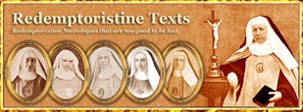
.jpg)









